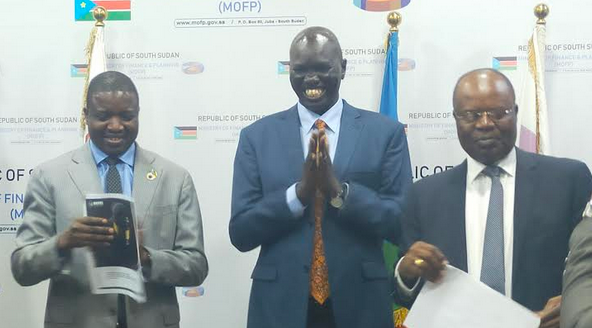South Sudan`s Ministry of Finance and the Bank of South Sudan on Tuesday signed a Memorandum of Understanding to officially join the Macroeconomic and Financial Management Institute (MEFMI) of Eastern and Southern Africa.
The MEFMI is an intergovernmental regional capacity-building organization that designs and delivers customized capacity-building programs to client institutions in priority areas of Sovereign Debt, Macroeconomic, and Financial Sector Management to support economic and financial stability in its member countries.
Speaking during the ceremony at the finance ministry in Juba, James Alic Garang, the Governor of the Bank of South Sudan, said membership in the MEFMI will benefit South Sudan`s finance ministry in terms of capacity building in debt management, debt transparency, debt reporting, and debt recording and will as well benefit the Central Bank in terms of macroeconomic forecasting, and reserve management which are essential for the country.
He said MEFMI will also help South Sudan tap into the development of other financial sectors that remain untapped.
“In this country, we depend so much on a narrow market and that is the foreign exchange market but there are other markets that we have not developed like the bond market and development of financial markets that we see in Zambia, Kenya, South Africa, Egypt, Ghana and other places,” he said. “This is an area as a country that we need to tap into.”
For his part, Louis Austin Kasekende, the Executive Director for the MEFMI, said their main focal areas are macroeconomic management, debt management, and financial sector development but they also pride themselves in responding to the capacity needs of a country so they will build the capacity of South Sudan depending on the training needs.
“We organize intermediate training, and we also have advanced courses, so, we will be in discussions with the ministry and the Central Bank and agree at the point of entry, should it be foundation, intermediate, or advanced, it could even be a mix,” he said. “We are in a very evolving environment, 15 years ago, few central banks could have even talked about climate change, technology, intelligence, machine learning in the way we conduct our work. We pride ourselves by also studying that environment and helping our countries to respond to these evolving challenges.”
Meanwhile, Agok Makur Kur, South Sudan`s Deputy Minister of Finance and planning, said joining the MEFMI will benefit the country in terms of capacity building and human resources
“To be part of this MEFMI, we will benefit as South Sudan especially in the ministry of finance and central bank, in terms of capacity building and human resources,” he stated. “We will also not only learn about debt management and macroeconomics but we can also go beyond, as you know, we have many resources on the African continent that need to be used through this MEFMI. Through training and capacity building, we can use our resources.”
Makur said South Sudan will immediately pay membership fees to MEFMI.




